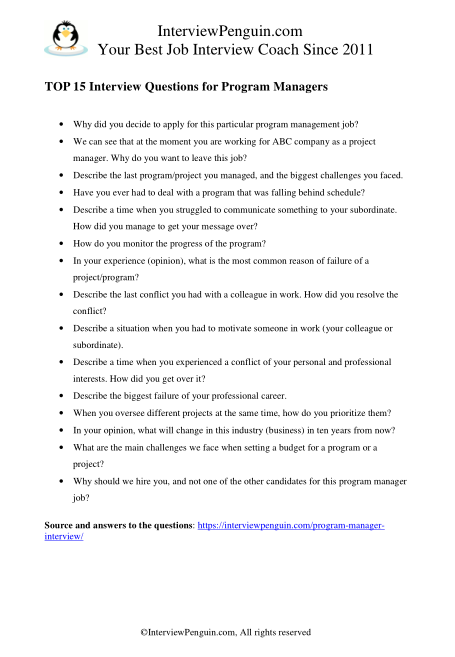Expect to interview in front of a panel. Few leading figures from the company will be present, often accompanied by an HR manager, and one or two existing program managers. The bigger the company (or NGO), the more interviewers you will meet on the big day, the day when your future will be decided.
They will ask you primarily situational and behavioral questions, related to strategical planning, supervision of project managers, and especially to various tricky situations that can (and often will) happen in the workplace. Some questions will relate to your past experience, and projects/programs you managed.
They may ask you also a few technical questions, related to your specialization, such as IT, Pharma, or Engineering, depending on the type of programs you will oversee in your new job. But technical questions differ from one interview to another. In this article I will focus on questions that tend to repeat in most program management interviews, and give you an advice on how to answer each one. Enjoy!
Table of Contents
Why did you decide to apply for this particular program management job?
First and foremost, you should refer to your past experience. Relevant projects or programs you’ve managed before, the goals you tried to achieve in them, and how managing these projects helped you to get ready for the position you try to get with their company.
They should see some logic in your answer, and feel that your past experience has (at least somehow) prepared you for your new role, that your career journey makes sense up to this point, and the job with them is a next logical step on that journey.
Second thing you can refer to are their goals–things they want to achieve in the company, their values, and basically why the programs exist. Tell them how these things resonate with your own values and beliefs. Show them that you applied with a clear vision of what you want to achieve in your new job, and see a meaningful purpose in what they do in the company.
Sample answer:
I picked your job for a few reasons. The first one is my experience in this specific field of IT. I’ve worked in the field for ten years now, mostly on managerial roles, and know what challenges we will face, and how to address them. Secondly, I really like your big vision, how you dream of putting dent to the Universe, becoming the no. 1 player in the field. This resonates strongly with my own goals, since I always dream big. Last but not least, I got a recommendation from a friend who works here, and who praised the working culture and the leadership of the company.
We can see that at the moment you are working for ABC company as a project manager. Why do you want to leave this job?
This question tests your attitude. Avoid negative remarks on the address of your present (former) employer and colleagues. Try to focus on the future, and explain why it makes more sense for you to leave your present employer.
For example you can say that at this stage of your career you feel ready to move to strategical role of a program manager, but there is not an option to make this move with your current employer–since they do not open the position, due to the size of the company, or organizational structure. Therefore you look for a new employer.
Or you can say that the direction your present organization is taking does not resonate with your values anymore, and you decided to move on, and seek a new challenge. Obviously these are just two examples and you can use many other reasons to explain your choice, but you should avoid criticizing particular employees in your present job.
Sample answer:
Honestly I cannot say anything bad about my present employer. We’ve learned a lot together, and I helped them to get running several key projects (we can talk more about them if you want). However, I feel that at this stage of my professional career I am ready to move to a more strategical role in the company, and do not have such an option with my present employer. We discussed it together and they agree that I leave, since they do not want to hold me back. In the position you advertise I can see myself benefiting from everything I’ve learned with my present employer, and at the same time growing professionally, becoming an even better manager and leader.
Describe the last program/project you managed, and the biggest challenges you faced.
Try to speak like a program manager. That means: Clearly define the goals of the project/program, the key figures in the team, the milestones you set, the budget, and the time frame. Then you can briefly narrate you process of planning, and how you progressed strategically in reaching each milestone. Narrate the challenges you faced, and how you addressed each one. Give credit to other people from the team, and describe the eventual completion of the project.
But try to avoid technical language–most people in the interviewing panel won’t understand it anyway. Simply tell them a story of how you managed a project or a program from scratch to successful finalization. They may ask you follow-up questions at this point, or inquire about other projects you managed before. Just lead a meaningful discussion, explain the challenges you faced, results you achieved, and so on.
Sample answer:
I’ve worked on a variety of projects in my career in marketing, and I certainly learned something from each one. If I should pick the best one, however, it would be the advertising campaign we ran fro XYZ client. We faced a lot of uncertainty in this campaign, since it was an innovative product and customers weren’t ready for it yet. We focused on influencer marketing, partnering with strong names on Instagram and Facebook, people who had the right audiences, and loyal followers. It worked great, because following their role models, people weren’t afraid to give the innovative product a try, and since it delivered on the promises, the sales sky-rocketed and the entire campaign was a great success. Judging by numbers, this was definitely the best project I’ve ever worked on, and also my last with the company.
Have you ever had to deal with a program that was falling behind schedule?
This is perhaps the most common problem program managers (and many other professionals) face in their work. If you have managed at least five projects before, certainly some of them were falling behind schedule, and you had to address the problem.
Say how you had one on one meetings with all key figures in the project/program, trying to clearly identify the reason why you fell behind schedule, and then you addressed it accordingly (revisiting the plan, relocating the resources and tasks of various team members, introducing agile methodology to the project, etc). Once again, try to speak in a simple language, and clearly show the value you brought in, while dealing with this difficult situation.
Sample answer:
I faced this problem more than once. To be honest, in construction business it is very hard to meet the schedule, since we work with many sub-contractors, we deal with weather changes, and of course when you try to win a contract you have to promise an early completion date, or at least something competitive. As soon as I realized that we were falling behind the schedule, I always tried to identify the reason, or more reasons. Then it was about talking to people or companies responsible for the delays, and trying to figure out how to get back on track. Of course, sometimes things are outside of your control and within the budget you have, you just do miracles and get back on schedule. In such cases it is pivotal to make sure to minimize the delay, and clearly explain it to all stakeholders.
Describe a time when you struggled to communicate something to your subordinate. How did you manage to get your message over?
You will talk to all kinds of people as a program manager. It will be a nice mix of intellects, and characters. Show the interviewers that you do not mind stepping out of your comfort zone, adjusting your language to the abilities of the recipient of the message.
You can point to demonstration, pictures, charts, and presentations, as a way to simplify your message, and to ensure that the other party got your point correctly. You should do this while narrating a situation from the past, ideally from your last job.
Once again, they test primarily your attitude with this question. They want to hire empathic program manager, someone who understand the crucial role of communication, someone who do not mind simplifying his language to ensure that everyone else understands them.
Sample answer:
I recall a situation from my last job, when I had to describe a technical issue to a person with no technical background. At the beginning I did not realize the lack of their technical skills, and started talking as if I was talking to a software engineer. But watching they face twisting and grimacing I quickly realized my mistake. Hence I started again, and this time describing everything simply, in a non-technical language, with a help of practical examples and demonstration. It worked, and the person eventually got the message, or at least they understood what I expected them to do. In my opinion, it is crucial to get over our ego, and always speak in a way our audience can understand. Because if they do not understand us, we can hardly expect them to follow our orders…
How do you monitor the progress of the program?
You have a few options for a good answer to this question. First one is saying that you set clear goals for the entire program, and each team involved in work. Then you monitor it on weekly basis, while meeting the team leaders and ensuring they progress according to the plan.
Second option consisting in mentioning technical tools and software which helps you to monitor the progress, for example Asana, Trello, or MS Project.
Whatever you say, you should emphasize the importance of regular monitoring of progress of individual teams, as a way of identifying problems early on, and ensuring the project/program won’t fall behind schedule.
Sample answer:
I am a bit old-school when it comes to monitoring the progress of the program. I typically set clear goals for every team involved, and then simply monitor the progress on a weekly basis, meeting each team leader personally and asking them the right questions. Do not really use any fancy tools or apps, but I do not mind learning to use some, if that’s the way you do the work in this organization.
In your experience (opinion), what is the most common reason of failure of a project/program?
Two words answer: human factor. But they probably want to hear something more elaborate :). You can point out a few common reasons why projects do not succeed, such as planning failure, organizational failure, or leadership failure.
What I suggest, however, is to avoid referring to reasons that are beyond your control, such as new competitors entering the market, unexpected development of the economy (expansion, recession, pandemic), or new laws and regulations (bureaucracy) that hinders the completion of the project.
Show the interviewers that you are ready to accept the responsibility, and do not want to make excuses. In a perfect answer you should mention a failure you experienced, clearly define what caused it, accept the responsibility for the failure, and explain the lesson you learned as a project/program manager in this case.
Sample answer:
Well, this clearly depend on the field of business. In my field, it is typically the planning failure, since in each project we have many unknown variables, and it isn’t easy to set the budget correctly, or to anticipate the challenges we will face. Anyway, the key is to re-evaluate your plans and goals on the go, and making sure you predict at least what you can predict. Doing so, you can minimize the likelihood of failure, though you can not eliminate it completely…
Other questions you may face in your program manager interview
- Describe the last conflict you had with a colleague at work. How did you resolve the conflict?
- Tell us about the time when you had to motivate someone in work (your colleague, member of a program team, etc).
- Tell us about a time when you had to meet a tight deadline.
- Have you ever worked on a project that was a failure?
- When you oversee different projects at the same time, how do you prioritize them?
- In your opinion, what will change in this industry (business) in ten years from now?
- Tell us about a time when you felt overwhelmed with work.
- Why do you want to work for us, and not for one of our competitors?
- Tell us about a time when you had to give a difficult feedback to someone.
- Why should we hire you, and not one of the other candidates for this program manager job?
* If you are not sure how to answer the questions from my list, or experience interview anxiety, have a look at our Interview Success Package. Up to 10 premium answers to basically all questions you may face in your program manager job interview will help you streamline your interview preparation, find the right words in every moment of the interview, outclass your competitors, and eventually get this great job. Thank you for checking it out!
Final thoughts
Before you go to the interview, think carefully about all projects and programs you managed in the past. Recall what you learned while leading them, the challenges you faced, and especially the value you brought with your work to the project, to your former employers. More likely than not you will discuss these things with your interviewers.
Last but not least, come in with the right mindset. Believe that you will succeed, and think nicely about your interviewers. This will reflect in your non-verbal communication, and you need to have a good one in order to outclass the many job candidates who will compete with you for any program management role. I hope you will succeed, and wish you best of luck!
Matthew
* You can also download the list of questions in a simple one-page long PDF, and practice your interview answers anytime later, even when offline:
May also interest you:
- Project management interview questions – Some technical and behavioral questions for future project managers.
- Leadership interview questions – An essential skill for every good manager, your leadership skills will be tested in an interview for virtually any managerial job. Are you ready to demonstrate them in an interview?
- Program Director interview questions.



